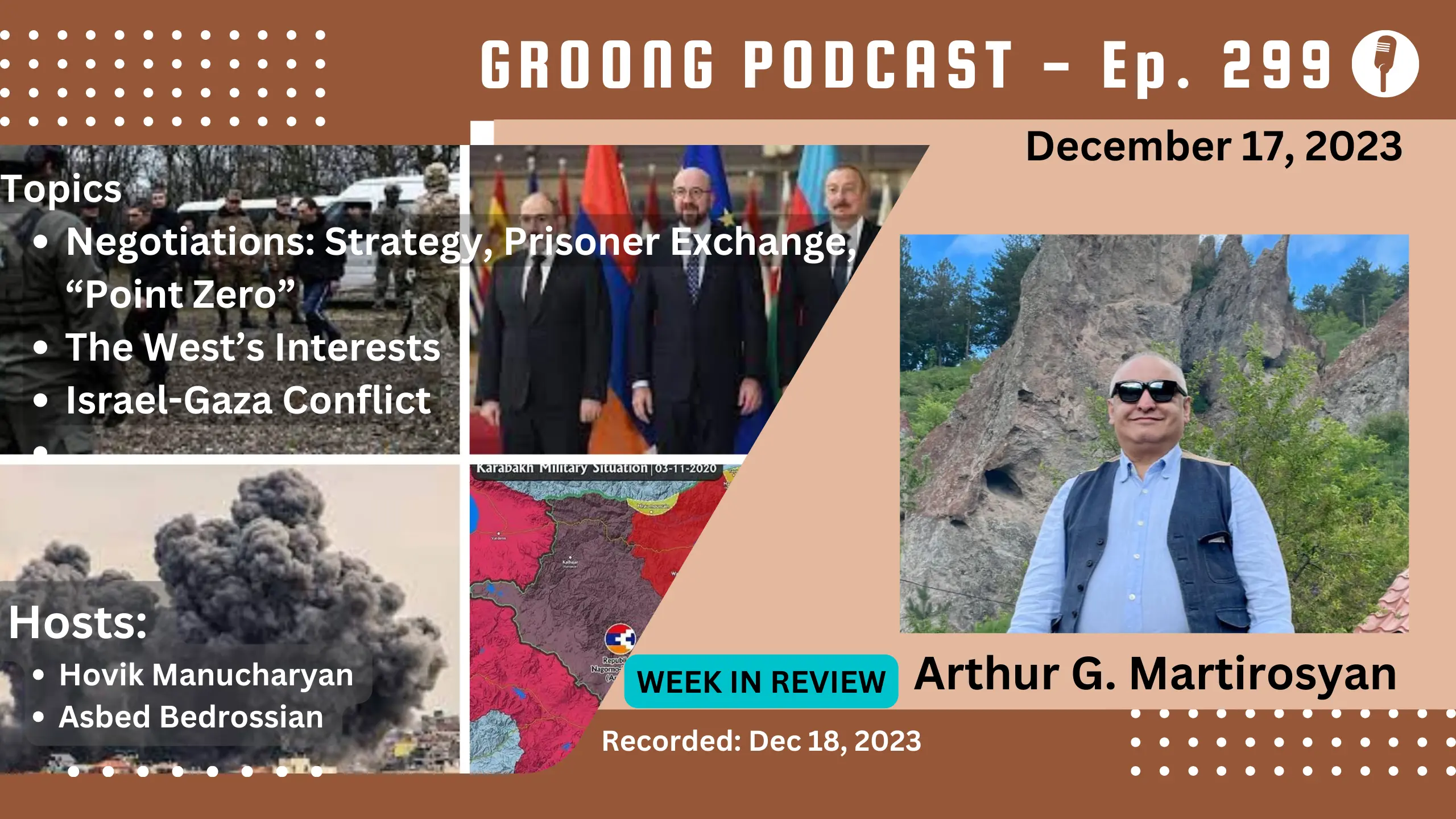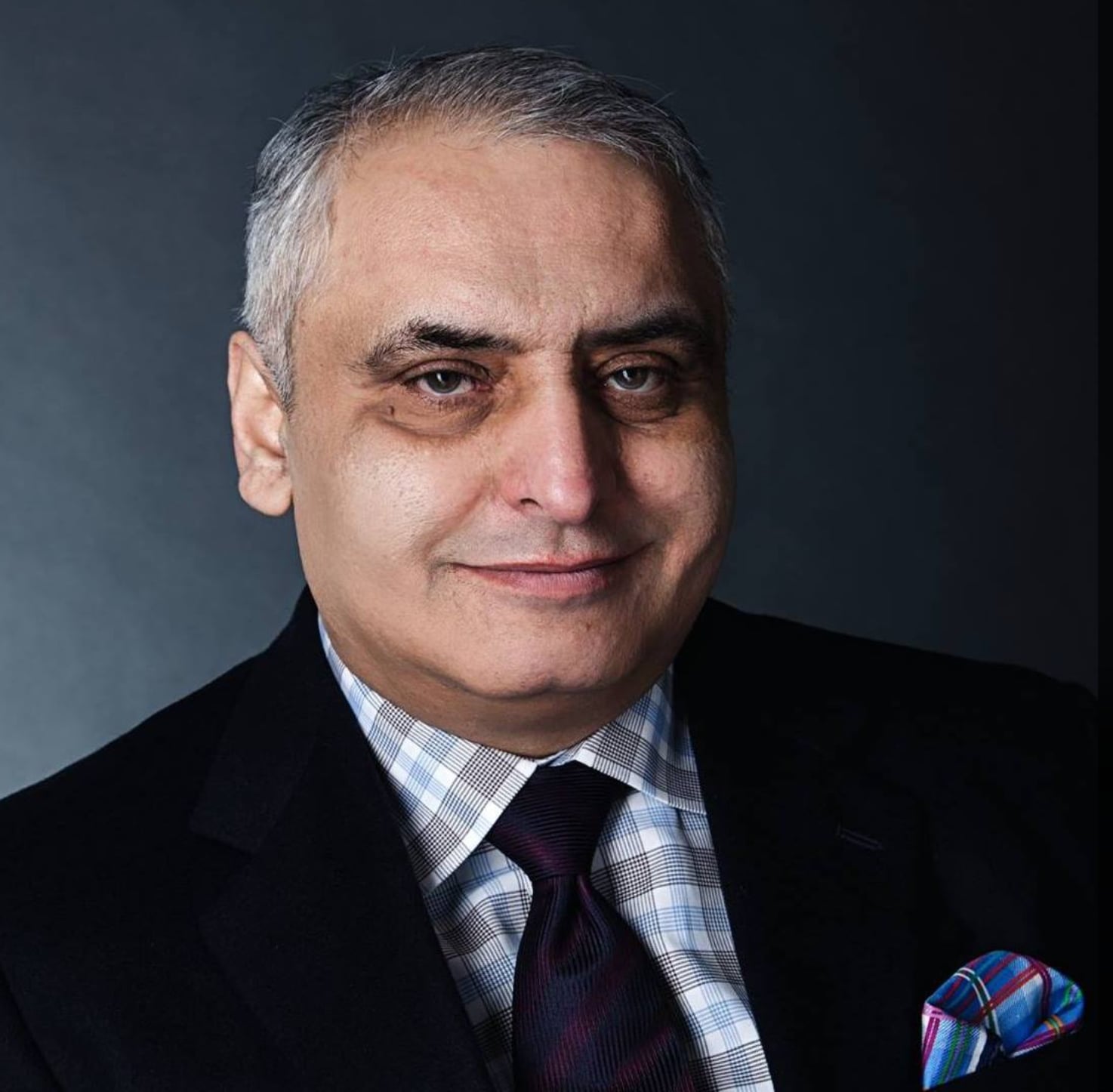
Groong Links:
Guest:
Topics:
- Negotiations
- Strategy, Prisoner Exchange, “Point Zero”
- The West’s Interests
- Israel-Gaza Conflict
Episode 299 | Recorded: December 18, 2023
Show Notes
Topics This Week
Negotiations
The past couple of weeks we’ve seen developments in Armenia’s interactions with Azerbaijan, Russia, the US, Turkey or the EU.
For example:
- Between Armenia and Russia, there’s a full on war of words, and even some actual actions afoot. For example the customs issues at the Lars checkpoint; the claims and counter-claims about Russian TV violations of intergovernmental agreements for retransmission in Armenia; the threats of exiting the CSTO and the warnings from Russia about it; etc.
- With Azerbaijan, there was the exchange of prisoners; Armenia’s call to return to negotiations in the west; to pull back armed forces from the borders; and for the millionth time reaffirming its commitment to opening transportation links for Turkish-Azeri use. All of which seem to have fallen on deaf ears.
- On the EU front, they’re expanding their monitoring mission in Armenia, but Charles Michel has suddenly become unable to say “Nagorno-Karabakh”, he just Artsakh “that region of Azerbaijan”.
- Meanwhile the US and Turkey play good cop bad cop with Armenia. Turkey pushes Armenia to open the “Zangezur corridor”, while the US tries to make sure Russia and Iran don’t control whatever Turkish corridor connects the Turanic world, and puts it in terms of protecting Armenia.
Should we look at these from the perspective of crisis management and negotiation tactics?
Questions:
- Is there a strategy to Armenia’s overall approach to negotiations?
- Is there an unstated Pashinyan doctrine that governs the government’s approach?
Prisoner Exchange
Arthur, the last time you were on our show (see Episode 281) we asked you about how Armenia should negotiate with Azerbaijan when the latter is holding on to tens if not hundreds of Armenian prisoners (or hostages to be more precise). You responded that this was akin to negotiating with the devil and provided a stern warning that by accepting to negotiate while the prisoners are still in Baku and being used against us, is tantamount to accepting the “devil’s” terms. You said that Armenia should cease negotiations until the issue of the prisoners is settled by the mediators.
Armenia implemented a so-called “prisoner swap” with Azerbaijan where Armenia released two Azerbaijani criminals who infiltrated Armenia and one of whom murdered an Armenian civilian, in exchange for 32 Armenian soldiers, most of whom seem to be from the Khtsaberd incident.
Questions:
- What are your thoughts about what happened so far?
- Your advice in the past was that the mediators should work to secure the release of prisoners, but it seems that everyone (including Armenia) is accepting that keeping some hostages is fine during these negotiations. How is it possible for Azerbaijan to keep POWs for this long (3 years) - and it has acquired new ones along the way too - while being treated by the international community as a legitimate negotiating party?
The means through which the two Azerbaijani criminals were released also leaves a lot of questions to be asked, especially since Akhundov’s sentence (the one that murdered the Armenian security guard) was extended just last week to a life sentence. According to a Hraparak article, there are three 3 ways that criminals like this could be released:
- International convention where a criminal who is a foreign citizen can be released to the country they’re a citizen of in order to serve their sentence there. Hard to believe that Azerbaijan will make Akhundov serve even 1 day, we already saw pictures of him getting a hero’s welcome at home.
- Court releases the individual conditionally.
- On the prime minister’s recommendation, the president issues a pardon.
While the government is silent, the Hraparak article surmises that the latter (a pardon) is the most likely scenario considering the first two would require a lot of paperwork and judicial hearings.
Meanwhile, after the news of the release, the family of the murdered security guard spoke up that the Armenian government hasn’t sought their approval for this move and criticized the exchange of criminals for legitimate prisoners as unjust.
Question:
- How important is it to communicate this issue properly with the public? How important is it to seek the approval of the victim’s family?
“Point Zero”
The exchange of prisoners was presented with great fanfare in government-controlled media, and as a great success in the west. Even Turkey, Russia, Iran and others joined the US and dozens of EU countries in congratulating it. Pashinyan took it a step further and dubbed the exchange in his own words as the new “point zero” in negotiations.
Question:
- We were at ground zero in 2018, we’re still at zero now. But really, what does it mean to have a so-called “point zero” in negotiations? Does it mean you ignore everything that came before?
Following Pashinyan’s announcement, Ararat Mirzoyan on December 13 said that Armenia and Azerbaijan were in talks to withdraw from the border in a mirrored fashion. Despite this positive announcement and for all the talk about “point zero”, Azerbaijan rejected withdrawing their forces until a final agreement.
Question:
- Is Azerbaijan invested in discussions for peace? Why would they reject a step that could only bring an environment of mutual trust?
The West’s Interests
We’ve frequently covered the tensions between the West and Russia in the Caucasus.
This week, there was a new article in The Foreign Policy In Focus titled “IN THE CAUCASUS, THE U.S. PRIORITY IS FOSSIL FUELS, NOT ARMENIANS”.
_“As we go from the medium to the longer term, there’s going to have to be some effort made to help integrate these folks into Armenian life,” AID official Alexander Sokolowski [told](https://foreignaffairs.house.gov/hearing/the-future-of-nagorno-karabakh/) Congress in November. “Many of them dream of going back to Nagorno-Karabakh, but for right now, they’re oriented towards making a life in Armenia.”_
It is easy to simplify these east vs west arguments into an absurd binary where one is good while the other is bad. But at the risk of crossing that line, we wanted to ask you:
Questions:
- What do you think of the ideas expressed in this article?
- Are fossil fuels and energy the only interests the west has in the Caucasus?
Israel-Gaza Conflict
Last time we spoke, October 1, most of the world thought that the possibility of additional conflicts was remote. Yet only a week later we saw a brazen attack by Hamas on October 7 followed by a punitive Israeli offensive into Gaza, which is still raging on.
Despite ramping worldwide backlash against Israel’s disproportionate response, Biden’s administration continues steadfast support for Israel, even though behind the scenes it has given Netanyahu warning to stop targeting civilians. Regardless, the US is providing military support to Israel as well, sending tens of thousands of missiles to help it “defend” itself against Gaza.
There is waning support in the west to keep bankrolling the war in Ukraine.
Questions:
- Is the west distracted by the war in Gaza, or do they realize that they’re not going to spend Russia into the ground, given that China is behind it, or some other reason why the west is now publicly discussing lower levels of funding and support for Ukraine?
- What are some of the outcomes from the Israel-Gaza war that could affect Armenia and the South Caucasus?
Topics from the Panelists
- Arthur: Georgia and the EU candidacy.
- Hovik: Will Georgia in the EU help or Harm Armenia?
Wrap-up
We hope you found our Week in Review helpful. We invite your feedback and your suggestions, you can find us on most social media and podcast platforms. Thanks to Laura Osborn for the music on our podcasts.
Guests

Arthur G. Martirosyan
Arthur G. Martirosyan is a Senior Consultant with CM Partners. In 1994, after graduating from Yale University, he joined Conflict Management Group and Harvard Negotiation Project, and has since worked on conflicts in the former Soviet Union, the Middle East, the Balkans, Africa, and Latin America.
Hosts

Hovik Manucharyan
Hovik Manucharyan is an information security engineer who moved from Seattle to Armenia in 2022. He co-founded the ANN/Groong podcast in 2020 and has been a contributor to Groong News since the late 1990s.
Disclaimer: The views expressed by Hovik Manucharyan on the ANN/Groong podcast are his own and do not necessarily reflect the opinions of his employer or any other organization.

Asbed Bedrossian
Asbed Bedrossian is an IT professional, and for years oversaw the central IT enterprise infrastructure and services at USC. His decades of experience spanned across IT strategy, enterprise architecture, infrastructure, cybersecurity, enterprise applications, data center operations, high performance computing, ITSM, ITPM, and more.
Asbed founded the Armenian News Network Groong circa 1989/1990, and co-founded the ANN/Groong podcast in 2020.